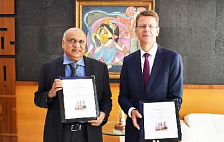THE ROADMAP INCLUDES MILESTONE COMMITMENT TO CUT CO2 EMISSIONS BY A QUARTER BY 2030
-
Major producers from across the globe (representing 80% of total production outside China) come together to affirm their commitment to net zero concrete by 2050 and agree to an ambitious intermediate goal of preventing 5 billion tonnes of CO2 emissions by 2030
-
The commitment represents a significant acceleration of the industry decarbonizing its products
-
This is a major step to eliminate the CO2 footprint of concrete – the world’s most used human-made material
-
The industry calls on policymakers, governments and multilateral organisations to play their part through public procurement reforms, appropriate carbon pricing mechanisms, legislation to support a circular economy and the development of new technologies.
Forty of the world’s leading cement and concrete manufacturers joined forces to accelerate the shift to greener concrete by pledging to cut CO2 emissions by a further 25% by 2030, marking a decisive step in the race to ‘Net Zero’ concrete by 2050.
The move by the members of the Global Cement and Concrete Association (GCCA) marks the biggest global commitment by an industry to net zero so far – bringing together companies from the Americas, Africa, Asia, including India and China, and Europe. It follows the September announcement during New York Climate Week that the GCCA has become the first global ‘heavy’ industry accelerator for the UN’s global Race to Zero. GCCA members account for 80% of the global cement industry volume outside of China, and also include several large Chinese manufacturers.
The GCCA has published a detailed roadmap which sets out the path that the industry will follow to fully decarbonize by 2050, a target aligned with the Paris Agreement to limit global warming to 1.5°C. The roadmap actions between now and 2030 will prevent almost 5 billion tons of carbon1 from entering the atmosphere compared to a business-as-usual scenario, equivalent to the CO2 emissions of almost 15 billion passenger flights from Paris to New York.
Concrete is the most used human-made material on the planet with 14 billion cubic meters3 produced every year for use in everything from roads to bridges, tunnels to homes, and hydropower installations to flood defenses. Concrete is an essential element of construction, with no other material equaling its resilience, strength and wide availability. Production of cement, the key ingredient in concrete, accounts for around 7% of global CO2 emissions. The new 2030 commitment by the GCCA outlines a significant acceleration in the pace of industry decarbonization.
The roadmap to get there is built around a seven-point plan that relies on ambitious yet achievable actions to reduce the amount of CO2 intensive clinker in cement, significantly reduce fossil fuel use in manufacturing, and accelerate innovation in products, process efficiency and breakthrough technologies including carbon capture.
Thomas Guillot, GCCA Chief Executive, said: “Concrete is the world’s most used building material and provides the foundation for renewable energy transition, resilient infrastructure and new homes around the world.”
He added: “Global cooperation on decarbonizing concrete is a necessity, as countries developing their infrastructure and housing will be the biggest users of concrete in the coming decades. I am proud of the commitment made by our members today to take decisive action and accelerate industry decarbonization between now and 2030, an important milestone towards the ultimate goal of net zero concrete. I envision a world in the not too distant future where the foundation of a sustainable, zero carbon global economy will literally be built with green concrete.
GCCA member companies operate in almost every country of the world with a global cement and concrete market worth $440 billion annually and supporting a wider construction sector which represents 13% of global GDP. The Association counts companies such as CEMEX, CNBM, CRH, HeidelbergCement, Holcim and Votorantim as members. The industry last year announced its ambition to fully decarbonize by 2050 and today is detailing its roadmap to achieve this goal.
António Guterres, Secretary-General of the United Nations, commented: “I invite all cement companies to join this vital endeavour. The transition cost should not be borne only by the first movers. I call on all governments and relevant actors to align public and private finance and procurement to create strong markets for net zero-aligned industrial production and develop national sectoral roadmaps towards net zero emissions. Three quarters of the infrastructure that will exist in 2050 has yet to be built. Without credible action now, future generations will have no liveable planet to build upon. The United Nations stands ready to support you in accelerating the transformation of your industry.”








